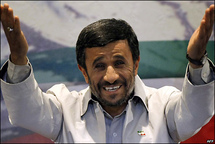Ahmadinejad says West still untrustworthy over Iran talks
Aresu Eqbali
TEHRAN, Aresu Eqbali - President Mahmoud Ahmadinejad said on Saturday Iran still distrusts Western powers when it comes to holding talks, but that he also hopes the nuclear dialogue between the two sides will continue.
His comments came as the United States warned it will not wait for ever for Tehran's response to a UN-drafted deal to supply Iran with nuclear fuel in exchange for its low-enriched uranium (LEU).

"The best way for you is to respect the Iranian nation and cooperate honestly with this nation," Ahmadinejad said, addressing Western powers, the official IRNA news agency reported.
He said Iran approaches the talks with Western powers over Tehran's nuclear programme with a sense of distrust, because of what he called their past "negative record."
"We hope the negotiations continue and evil powers don't indulge in mischief because the Zionist regime and other domineering powers are unhappy with the talks," Ahmadinejad said.
"The government, like all Iranian people, looks at the negotiations with no trust, given the negative record of Western powers."
Ahmadinejad appeared to return to his traditional anti-West rhetoric after a positive comment on Thursday that "conditions were ready" for nuclear cooperation between Iran and world powers.
Western powers are awaiting a clear response from Tehran over the nuclear fuel deal brokered by UN atomic watchdog the International Atomic Energy Agency (IAEA).
France has said that under the deal 1,200 kilos of Iranian LEU -- enriched at a facility in Natanz in defiance of three sets of UN sanctions -- would be shipped abroad for further processing and conversion into fuel for a Tehran research reactor.
Western powers back the deal as the reactor is an internationally supervised facility, and the deal aims at removing Tehran's stock of LEU, a major concern in the West which suspects the enriched material could be further refined for use in nuclear weapons.
Tehran denies wanting to make atomic weapons.
The IAEA has confirmed that Tehran has given an "initial" response to the deal, but late on Friday IRNA reported that Iran's response was "not an answer" to the deal and that it wanted more talks.
US Secretary of State Hillary Clinton warned on Saturday that "patience does have finally its limits and it is time for Iran to fulfill its obligations and responsibilities to the international community and accepting this deal would be a good beginning."
She was speaking in Israel -- the Middle East's sole if undeclared nuclear-armed power -- a day after White House spokesman Robert Gibbs warned that US President Barack Obama will not wait for ever for Iran's formal reply.
"The president's time is not unlimited, this was not about talking for the sake of talking, this was about reaching an agreement that just a few weeks ago seemed to be something that the Iranians wanted," he said.
Israel, which maintains that world powers must keep all options on table to halt Tehran's nuclear drive, including a military strike, has also backed the UN-drafted deal.
Israeli Prime Minister Benjamin Netanyahu on Friday described the deal as "a positive first step."
But Iranian lawmakers increasingly appeared to oppose the deal.
"We are completely against the offer... I think the best option is to buy the necessary fuel for the Tehran reactor as before," said Alaeddin Borujerdi, who heads parliament's committee on national security and foreign policy.
He told ISNA news agency that Iran "widely distrusts Westerners" who "did not fulfill their contracts with Iran" in the past.
MP Kazem Jalali said there was "no guarantee" Iran would receive the fuel in exchange for its LEU, ILNA news agency reported.
Mousavi, who continues to reject Ahmadinejad's re-election as president, blamed the hardliner's "extremist" policies for the nuclear crisis.
"To have a small quantity of fuel we have to deliver a large stock of LEU. Is this a victory or a fraud?" he asked on his website Kaleme.com.
"It is the extremist attitude of the government which has created the situation for more sanctions on Iran."
--------------------------------------------------------------------------------------------------------------------------------